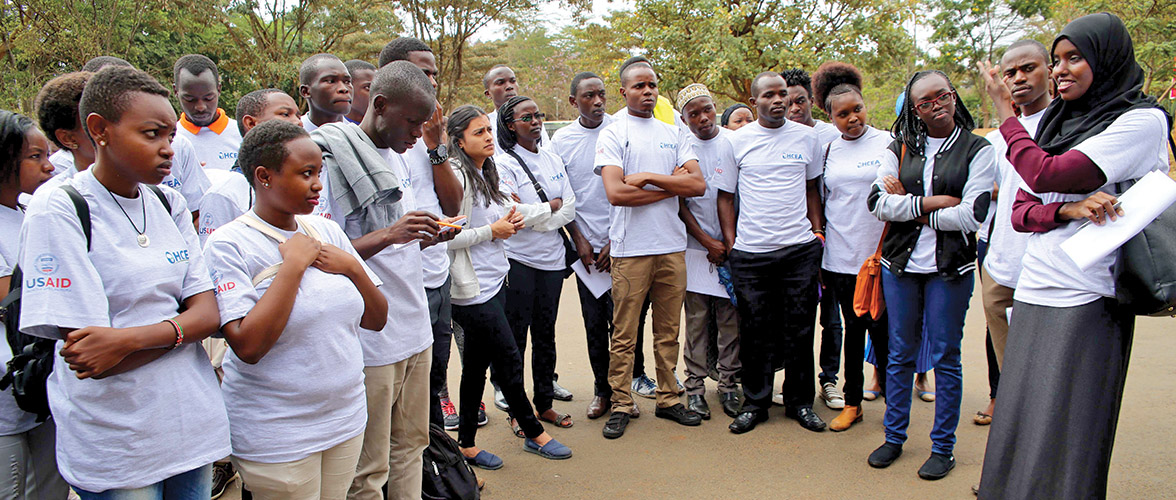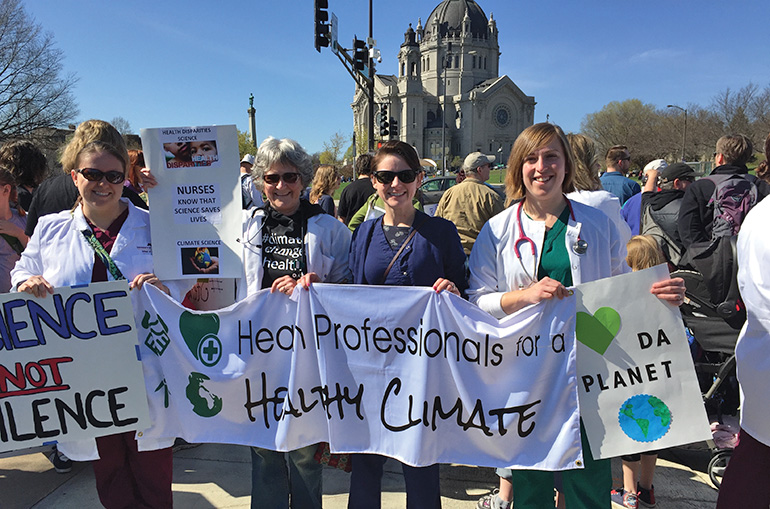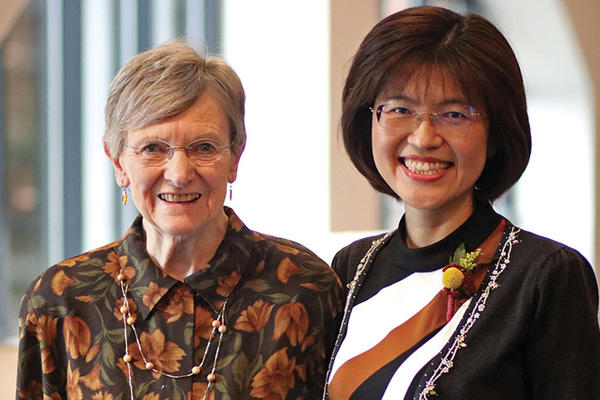Answering the call to action
As evidence points to climate change’s impact on health, the school steps up its planetary health efforts
March 21, 2019
Steve Rudolph and Brett Stursa

Just days after the U.S. Global Change Research Program delivered a report to Congress warning that effects of climate change, including damaging storms, droughts and wildfires, are worsening in the United States and are only expected to further disrupt life, the 2018 report of the Lancet Countdown on health and climate change: shaping the health of nations for centuries to come was published, warning of the human health risks of climate change. The New York Times reported that these two studies, published in late 2018, represented the most serious warnings to date that climate change is posing a series of interconnected health risks for the global population.
The School of Nursing recognized the health risks caused by climate change when it joined the Planetary Health Alliance, which is a consortium of over 120 universities, NGOs, government entities and research institutes around the world committed to advancing planetary health. The alliance, which is based at Harvard University, works with a broad array of scientific disciplines to build an evidence base for informing policy solutions aimed at optimizing both human health and environmental stewardship objectives.
“We are at an extraordinary moment in human history. Human activity is the dominant force determining biophysical conditions around the planet,” said Myers, who will be giving the School of Nursing commencement address in May. “We need to understand the moment that we’re in and the implications of the decisions we’re making to fuel that fierce urgency of why what we do now is so important.”
In that vein, faculty at the School of Nursing have taken the lead on several efforts to educate students, staff and communities about planetary health to leverage the unique role nurses play to call attention to this unprecedented time in history.
Interplay of animal, human and environmental health
The University of Minnesota is in its final year of a $63 million award from the United States Agency for International Development to carry out the One Health Initiative, which focuses on creating a global workforce prepared to predict, detect and respond to infectious disease outbreaks within the intersection of human, animal and environmental health. In partnership with the College of Veterinary Medicine, School of Nursing faculty providing project leadership and supporting key project activities, including interprofessional field training.
“One Health is a term that came out of the response to outbreaks at the intersection of animal, human and environmental cause-effect factors. They all interplay,” said Professor Carolyn Porta, PhD, RN, SANE-A, FAAN, who is the senior faculty adviser for Africa on the project and provides technical leadership on the initiative’s work. The One Health Workforce network includes 79 universities in eight African countries and five countries in Southeast Asia.
“Nursing is core on the human health side of outbreaks because nurses make up 80 percent of the human health care workforce around the world. They’re the first responders when there’s a threat for outbreak,” said Porta. “When there are symptoms developing on the human side, nurses are more than likely going to see it before any other health care provider.”
Numerous nursing faculty at the University of Minnesota have supported multiple field attachments at demonstration sites in Kenya, Ethiopia, Uganda and Rwanda, where faculty focus on applied interprofessional learning experiences that teach students about One Health in the real world. Professor Cheryl Robertson, PhD, RN, FAAN, led in developing demonstration sites and sharing her expertise in field attachments. Read more about her work to support the health of people displaced by climate change on page 26. In addition, Clinical Professor Jeannie Pfeiffer, DNP, MPH, RN, CIC, FAPIC, FAAN, has provided leadership in program development in One Health Workforce’s newest expansion country, Cambodia.
Climate change as a health care crisis
Clinical Professor Teddie Potter, PhD, RN, FAAN, still recalls the day she joined more than 400,000 others in New York City for the People’s Climate March in 2014.
“I carried a sign that said, ‘Minnesota nurses are fighting against climate change,’ and all along the route people excitedly kept saying, ‘The nurses are here! The nurses are here,” said Potter. “Nurses have a voice that people tend to listen to and trust. We can help people understand the connection between a healthy environment and healthy people.”
Potter and Clinical Assistant Professor Shanda Demorest, DNP, RN-BC, PHN, have been leading an interprofessional effort across the University to develop and incorporate content on the health implications of climate change into the curriculum. Developed in conjunction with climate champions from the Medical School, School of Public Health, College of Pharmacy and College of Veterinary Medicine, along with the Medical Laboratory Sciences and Occupational Therapy programs, the first phase of their efforts ensured more than 1,100 first-year students in 17 different health programs on five campuses were introduced to the topic in their Foundations for Interprofessional Collaboration and Communication course.
Phase two, which was recently completed, created nine modules on the connection between climate change and health for instructors across the University to incorporate in their existing courses.
“Our pediatric or maternal and child health courses are a natural fit, as well as geriatric courses as climate change is affecting older individuals more,” said Demorest.
The interprofessional content, which is housed at the Center for Global Health & Social Responsibility, is available for any university to use and has already been adopted internationally. The Academic Health Center Climate Champion Team is now in the third phase of the efforts, which aims to have students implementing sustainability, climate or planetary health projects in the community.
Both Potter and Demorest see nurses as natural leaders on climate change because of their large numbers, their high degree of patient interaction and their trusted voice.
“This is who we are. We think about the human relationships, communities, long-term health, prevention and the environment,” said Potter. “This is the sphere we have traveled since Lillian Wald developed public health nursing. This is our sphere.”
For Potter, the focus on planetary health and efforts to incorporate climate change into the curriculum are also personal. “I would love to say that my grandchild who was born last fall will not have to worry about climate change,” she said.


